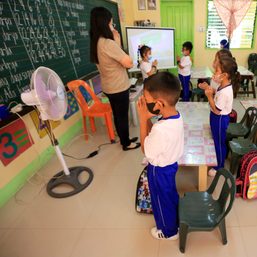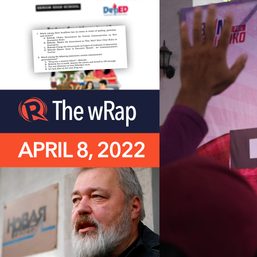SUMMARY
This is AI generated summarization, which may have errors. For context, always refer to the full article.

The coronavirus pandemic has highlighted school opening woes that have long existed even before the health crisis happened.
In a surprise move, the Department of Education (DepEd) postponed the opening of classes for school year 2020-2021 from August 24 to October 5, 2020.
This is not the first time that school opening has been moved this year. As COVID-19 cases continued to rise, the usual June opening of classes was first moved to August 24. But the almost two-month extension appeared to be inadequate for DepEd to transition to the overhauled education system, prompting a second postponement to October.
DepEd decided to shift to distance learning for the coming school year to comply with President Rodrigo Duterte’s directive for schools to delay face-to-face classes until a coronavirus vaccine becomes available.
Can government now deliver safe, accessible, and quality education for all students? Here’s a list of the issues that government must prioritize before millions of basic education students start schooling.
Printing of modules
Modular learning is the “backbone” of the DepEd’s distance learning program as access to technology remains a problem for most students. Other modes of learning such as online, and TV and radio broadcasts would supplement the modules.
The printing of modules was supposedly the reason why the school opening was postponed yet again. There had been reports that some teachers didn’t have copies of the modules weeks before the original date of the school opening.
In a virtual press briefing on August 24, DepEd said that at least 4 schools division offices (SDOs) were “lagging behind” on the printing of modules. Only 7 regions were in the “advanced” status of printing, which means the SDOs in these regions are already printing 80% to 100% of SLMs. These regions are: Ilocos, Cagayan Valley, Calabarzon, Zamboanga Peninsula, Northern Mindanao, Caraga, and the National Capital Region (NCR).
Education Undersecretary Revsee Escobedo said the insufficient budget and supplies of bond paper contributed to the delay in the printing of learning materials.
While schools have a budget allocation for the shift to distance learning filed under school maintenance and other operating expenses (MOOE), teachers said this budget can be easily depleted due to the sheer number of modules that need to be printed.
Teachers from public schools took it upon themselves to launch donation drives to raise funds for bond paper and printers. (READ: Help! These schools need bond paper, printers for students’ learning modules)
Quality check of broadcast content
DepEd started a test run of television episodes for distance learning from August 11 until August 18. The first day of the test broadcast, however, did not go smoothly.
In one of the episodes aired, netizens were quick to point out “painful” grammatical errors in sample questionnaires for an English course.
After being criticized, DepEd vowed to improve the TV episodes. “Expect the agency to continue fixing issues to make sure everything is ready for the school opening, whether it’s online, on radio or TV, or through modular learning,” Education Undersecretary Alain Pascua said in Filipino.
Technology access
While online learning is only one option for distance learning, data shows that not all households in the Philippines have access to the internet.
Citing data from the National Telecommunications Commission, DepEd said that as of December 2019, 67% of the Philippine population have access to the internet.
Numerous social media posts have gone viral, showing Filipino students climbing trees, or even mountains, just to get a good internet signal for their classes. This outraged both netizens and student groups that called out educational institutions for prioritizing academic output over student welfare. (READ: During pandemic, student climbs a mountain to send class requirement)
But internet access is just part of a bigger problem for online classes.
Distance learning has caused a lot of concern among families, especially those who could not afford the tools needed for it. Students have resorted to different measures to meet the demands of schooling. (READ: Through #PisoParaSaLaptop campaign, students raise money to cope with distance learning)
Safety
Teachers’ anxieties over the opening of school only worsened when DepEd said it has no budget allotted for the treatment of teachers who contract COVID-19. (READ: No budget for treatment of teachers with coronavirus – DepEd official)
DepEd, however, pointed out that all government employees, including DepEd employees, are covered by PhilHealth, which is now a subject of investigation because of corruption allegations.
As of August 23, a total of 823 students and DepEd personnel have contracted the coronavirus disease.
Teachers and parents raised concerns about the modular learning setup as they fear contracting the virus during the distribution and retrieval of learning materials. (READ: Is it safe? Teachers fear exposure to coronavirus in modular learning setup)
“These teachers’ direct exposure to an infected parent highlights the risks associated with module distribution, largely due to lack of preventive measures at schools,” said Secretary General of Alliance of Concerned Teachers Raymond Basilio.
Basilio said the “old problematic ways of DepEd” will cause more harm than ever at this time of pandemic. “We need substantial measures to ensure school safety, and not further hazards like allowing it to be used as an isolation center,” he added.
Budget
Everything boils down to the lack of a sufficient budget. Amid funding issues for distance learning, DepEd earlier explained that their approved budget for 2020 does not include the cost of the revamped education system.
In an interview with Rappler on August 22, Education Undersecretary Anne Sevilla said that DepEd has requested an additional P65 billion budget for distance learning. However, in a virtual press conference on August 24, Sevilla said that DepEd failed to secure this from Congress.
“Sabi natin may P65 billion na supplemental at hindi nga natin ito nakuha at hindi rin siya makakamit within the year. So kailangan po natin magawa ang mga adjustment at ‘yung mga adjustment na ‘yan ay na-issue na rin through policy covers,” Sevilla said.
(We said that we need a P65-billion supplemental budget, we failed to get this, and we cannot get this within the year. So we need to do the adjustments, and these adjustments were issued through policy covers.)
Sevilla, however, noted that the P65 billion is being considered for the 2021 budget.
She also said DepEd is now using its existing P500-billion budget to support the basic education-learning continuity plan (BE-LECP). P400 billion has already been allocated for salaries of personnel.
Of the remaining P100 billion, P9 billion has already been downloaded to schools for the printing of modules; P17 billion has been realigned and modified; while P500 million has been set aside for reimbursement of expenses related to the observance of minimum health standards.
The Special Education Fund amounting to P20 billion was also aligned to BE-LCP.
Sevilla told reporters that ideally, DepEd would need P433 billion for its programs. Under conservative circumstances, as in present times, the agency would need P105 billion, including the fund for the laptop of teachers worth P27 billion.
Rappler asked Sevilla if DepEd can continue the school year even without the P65-billion supplemental budget. She said: “Like what we said, from the ideal, we went to the conservative, and now we’re going to the adjusted modality. There’s still a way… This will never be a hindrance for us to continue.”
Senator Ralph Recto, an economist, estimated that DepEd would be needing P30 to P35 billion more, “with other fund realignments, donations, grants from local governments, bulk printing already factored in,” to print the learning modules of some 21 million public school students for one full academic year.
Recto’s 93.6 billion pages estimate for the modules was pegged at just 80% of DepEd enrollees needing printed materials, with the rest getting these online. He made his estimations based on 20 pages per subject a week, 8 subjects, for 34 weeks, to be used by 17.206 million public school students out of the 21.507 million public students enrolled.
“Even if you cut the number of pages per subject by half, to 10 pages, we will still be needing between 48 billion to 59 billion pages,” he said.
Whether the total cost is P48 billion, or P96 billion, or P117 billion, what funds DepEd has at the moment will not be enough, Recto warned.
No country in the world was prepared for this unprecedented pandemic. But education – a constitutional right of every Filipino – should be made accessible to all under any circumstance. Can the Duterte government pull off a school opening with no student being left behind? – Rappler.com
Add a comment
How does this make you feel?


![[EDITORIAL] Ano sana ang takeaway ni Sara Duterte sa firesale ng mga laptops?](https://www.rappler.com/tachyon/2023/05/animated-DEPED-laptop-fiasco-carousel.jpg?resize=257%2C257&crop_strategy=attention)


There are no comments yet. Add your comment to start the conversation.